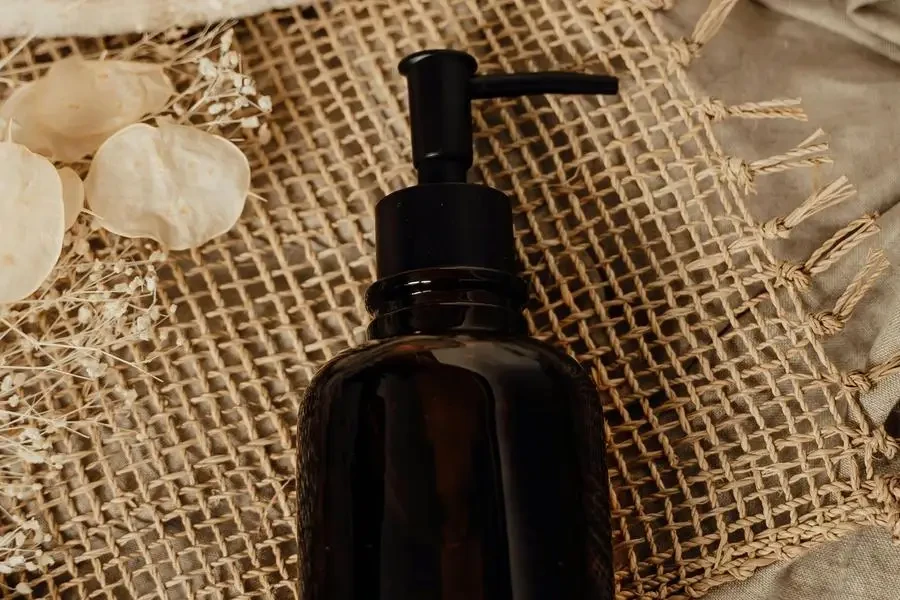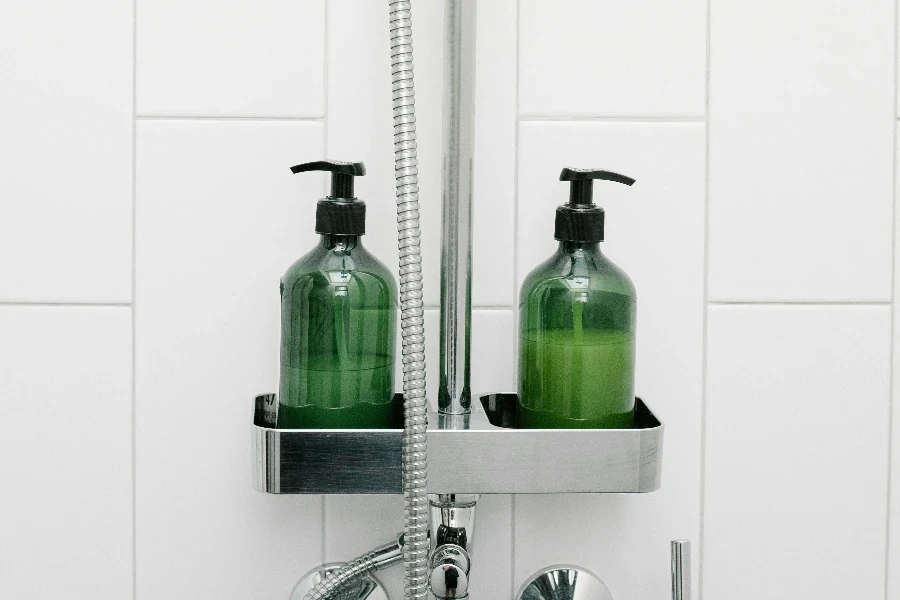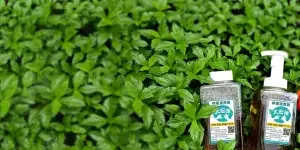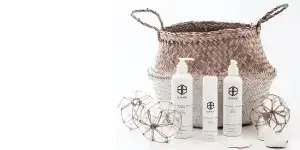In 2025, the demand for antibacterial body wash has seen a remarkable surge, driven by heightened awareness of personal hygiene and health. This article delves into the factors contributing to this growing trend, including social media influence and broader health and hygiene movements.
Table of Contents:
– Exploring the Surge in Antibacterial Body Wash Demand
– Diverse Antibacterial Body Wash Varieties: Pros and Cons
– Addressing Consumer Pain Points with Antibacterial Body Wash
– Innovations and New Entrants in the Antibacterial Body Wash Market
– Key Considerations for Sourcing Antibacterial Body Wash
Exploring the Surge in Antibacterial Body Wash Demand

Defining Antibacterial Body Wash: What Sets It Apart
Antibacterial body wash is formulated with specific chemical ingredients designed to eliminate bacteria on the skin. Unlike regular body washes, these products contain active agents such as triclosan and triclocarban, which are effective in reducing bacterial contamination. The unique selling point of antibacterial body wash lies in its dual function of cleansing and providing an added layer of protection against harmful microbes.
Social Media Buzz: Trending Hashtags and Influencer Endorsements
The rise of antibacterial body wash can be significantly attributed to the power of social media. Platforms like Instagram and TikTok have seen a proliferation of hashtags such as #AntibacterialBodyWash, #StayCleanStaySafe, and #HygieneFirst. Influencers and celebrities endorsing these products have amplified their reach, making them a staple in many households. The visual appeal and the promise of enhanced hygiene resonate well with the audience, driving up the product’s popularity.
Market Potential: Aligning with Broader Health and Hygiene Trends
The market potential for antibacterial body wash is immense, aligning perfectly with the broader trends of health and hygiene. According to a professional report, the global antibacterial soap market, which includes body washes, reached a value of USD 4.29 billion in 2023 and is projected to grow at a CAGR of 6.7% to reach USD 7.72 billion by 2032. This growth is fueled by the increasing awareness of personal hygiene, the prevalence of communicable diseases, and the rising demand for natural and organic products. The healthcare industry’s reliance on antibacterial products to prevent hospital-acquired infections further bolsters this market.
In conclusion, the antibacterial body wash market is poised for significant growth, driven by social media influence, heightened health awareness, and the ongoing demand for effective hygiene solutions. As consumers continue to prioritize cleanliness and safety, the popularity of these products is expected to soar, making them a lucrative investment for businesses in the beauty and personal care industry.
Diverse Antibacterial Body Wash Varieties: Pros and Cons

Natural vs. Synthetic Ingredients: A Comparative Analysis
In the antibacterial body wash market, the debate between natural and synthetic ingredients is ongoing. Natural ingredients, such as essential oils and herbal extracts, are increasingly favored by consumers due to their perceived safety and environmental benefits. According to a report by Research and Markets, the global antibacterial soap market, which includes body washes, is projected to grow significantly, driven by the increased usage of organic and natural ingredients. These natural components are often less irritating to the skin and are biodegradable, making them a more sustainable choice.
On the other hand, synthetic ingredients like triclosan and triclocarban are known for their potent antibacterial properties. These chemicals are effective in reducing bacterial contamination, which is crucial in healthcare settings and industries where hygiene is paramount. However, there are concerns about their long-term effects on health and the environment. For instance, triclosan has been scrutinized for its potential to disrupt endocrine functions and contribute to antibiotic resistance.
Business buyers must weigh these factors carefully. While natural ingredients may appeal to eco-conscious consumers and those with sensitive skin, synthetic ingredients might be necessary for products intended for high-risk environments. The choice between natural and synthetic should align with the target market’s needs and regulatory requirements.
Consumer Feedback: What Buyers Are Saying
Consumer feedback plays a vital role in shaping the antibacterial body wash market. Reviews and ratings on e-commerce platforms and social media provide valuable insights into product performance and consumer preferences. According to a professional report, consumers are increasingly vocal about their experiences, particularly regarding the effectiveness and skin-friendliness of antibacterial body washes.
Positive feedback often highlights the pleasant scent, moisturizing properties, and the feeling of cleanliness after use. For instance, products containing natural ingredients like tea tree oil and eucalyptus are praised for their refreshing and soothing effects. Conversely, negative reviews frequently mention issues such as skin irritation, dryness, and concerns about synthetic chemicals.
Business buyers should monitor consumer feedback to identify trends and potential areas for improvement. Incorporating consumer insights into product development can enhance customer satisfaction and loyalty, ultimately driving sales.
Effectiveness: Evaluating Antibacterial Claims
The effectiveness of antibacterial body washes is a critical consideration for business buyers. These products must deliver on their promise to reduce or eliminate bacteria to maintain consumer trust and meet regulatory standards. According to a report by Research and Markets, the active ingredients in antibacterial soaps, such as triclosan and triclocarban, are effective in reducing bacterial contamination.
However, the effectiveness of natural antibacterial agents is also noteworthy. Ingredients like tea tree oil, eucalyptus, and neem have demonstrated antibacterial properties in various studies. These natural alternatives are gaining traction as consumers seek safer and more environmentally friendly options.
Business buyers should evaluate the antibacterial claims of products through rigorous testing and certification. Ensuring that products meet industry standards and regulatory requirements is essential for maintaining credibility and consumer trust.
Addressing Consumer Pain Points with Antibacterial Body Wash

Skin Sensitivity: Solutions for Gentle Cleansing
Skin sensitivity is a common concern among consumers of antibacterial body washes. Products that cause irritation or dryness can lead to negative reviews and decreased customer loyalty. According to a report by Euromonitor International, the trend of “”skinification”” in bath and shower products is on the rise, with consumers seeking formulations that are gentle on the skin.
To address this pain point, manufacturers are incorporating soothing ingredients like aloe vera, chamomile, and oatmeal into their formulations. These ingredients help to calm and hydrate the skin, reducing the risk of irritation. Additionally, hypoallergenic and fragrance-free options are becoming more popular, catering to those with sensitive skin.
Business buyers should prioritize products that offer gentle cleansing without compromising on antibacterial efficacy. Partnering with suppliers who provide detailed ingredient information and dermatological testing can ensure the selection of high-quality products that meet consumer needs.
Environmental Concerns: Eco-Friendly Formulations
Environmental sustainability is a growing concern among consumers and businesses alike. The demand for eco-friendly antibacterial body washes is increasing, driven by awareness of the environmental impact of synthetic chemicals and plastic packaging. According to a report by Research and Markets, the use of natural and organic ingredients in antibacterial soaps is a key trend driving market development.
Manufacturers are responding by developing formulations that use biodegradable ingredients and sustainable packaging. For example, some brands are using recycled materials for their bottles and offering refill options to reduce plastic waste. Additionally, natural antibacterial agents like essential oils are being used to replace synthetic chemicals.
Business buyers should consider the environmental impact of the products they source. Choosing eco-friendly formulations can enhance brand reputation and appeal to environmentally conscious consumers, ultimately contributing to long-term business success.
Cost vs. Quality: Balancing Price and Performance
Balancing cost and quality is a critical challenge for business buyers in the antibacterial body wash market. While high-quality products often come at a premium price, they can offer better performance and customer satisfaction. According to a report by Research and Markets, the global antibacterial soap market is expected to grow, driven by the demand for effective and safe hygiene products.
To achieve this balance, buyers should conduct a thorough cost-benefit analysis. Investing in high-quality products with proven antibacterial efficacy and skin-friendly formulations can lead to higher customer satisfaction and repeat purchases. Additionally, sourcing products in bulk can help to reduce costs and improve profit margins.
Business buyers should also consider the long-term benefits of quality products, such as reduced customer complaints and returns. Partnering with reliable suppliers who offer competitive pricing and consistent quality can help to achieve the optimal balance between cost and performance.
Innovations and New Entrants in the Antibacterial Body Wash Market

Cutting-Edge Ingredients: The Latest in Antibacterial Technology
The antibacterial body wash market is witnessing significant innovation in terms of ingredients and formulations. According to a report by Research and Markets, there are significant opportunities for innovative product development in the market. Manufacturers are exploring new antibacterial agents that offer enhanced efficacy and safety profiles.
One such innovation is the use of silver ions, which have been shown to have 60,000 times the antibacterial efficiency of alcohol while being gentler on the skin. This technology is being incorporated into various personal care products, including body washes, to provide effective germ protection without causing irritation.
Business buyers should stay informed about the latest advancements in antibacterial technology. Partnering with suppliers who invest in research and development can provide access to cutting-edge products that meet evolving consumer needs and regulatory standards.
Packaging Innovations: Sustainable and User-Friendly Designs
Packaging plays a crucial role in the consumer experience and environmental impact of antibacterial body washes. According to a report by Euromonitor International, sustainable packaging is becoming increasingly important in the bath and shower market. Manufacturers are developing innovative packaging solutions that are both eco-friendly and user-friendly.
For example, some brands are using biodegradable materials and offering refillable options to reduce plastic waste. Additionally, ergonomic designs and easy-to-use dispensers enhance the convenience and appeal of the products.
Business buyers should consider the packaging of the products they source, prioritizing options that align with sustainability goals and enhance the user experience. Collaborating with suppliers who offer innovative packaging solutions can help to differentiate products in a competitive market.
Emerging Brands: Fresh Players Making Waves
The antibacterial body wash market is seeing the entry of new and innovative brands that are challenging established players. According to a report by Research and Markets, the expansion in emerging markets presents significant growth opportunities for the antibacterial soap market. These new entrants are often focused on niche markets and offer unique value propositions.
For instance, some emerging brands are specializing in natural and organic formulations, catering to health-conscious consumers. Others are leveraging advanced antibacterial technologies and sustainable practices to stand out in the market.
Business buyers should keep an eye on emerging brands and consider partnering with them to diversify their product offerings. Supporting innovative and agile companies can provide access to unique products and help to stay ahead of market trends.
Key Considerations for Sourcing Antibacterial Body Wash

Supplier Reliability: Ensuring Consistent Quality
Ensuring consistent quality is paramount when sourcing antibacterial body washes. Reliable suppliers are essential for maintaining product standards and meeting consumer expectations. According to a report by Research and Markets, the global antibacterial soap market is poised for significant growth, driven by the rising awareness of hygiene and the growing healthcare industry.
Business buyers should conduct thorough due diligence when selecting suppliers. This includes evaluating their production processes, quality control measures, and track record of delivering consistent products. Establishing strong relationships with reputable suppliers can help to ensure a steady supply of high-quality antibacterial body washes.
Regulatory Compliance: Meeting Safety Standards
Regulatory compliance is a critical consideration for business buyers in the antibacterial body wash market. Products must meet safety standards set by regulatory authorities to ensure consumer safety and avoid legal issues. According to a report by Research and Markets, the market faces challenges such as regulatory concerns, but there are significant opportunities for innovative product development.
Business buyers should stay informed about relevant regulations and ensure that the products they source comply with these standards. This includes verifying ingredient safety, labeling requirements, and manufacturing practices. Partnering with suppliers who prioritize regulatory compliance can help to mitigate risks and maintain consumer trust.
Bulk Purchasing: Strategies for Cost-Effective Sourcing
Bulk purchasing is a common strategy for business buyers to reduce costs and improve profit margins. According to a report by Research and Markets, the global antibacterial soap market is expected to grow, providing opportunities for cost-effective sourcing. Buying in bulk can lead to significant savings and ensure a steady supply of products.
Business buyers should negotiate favorable terms with suppliers, such as volume discounts and flexible payment options. Additionally, maintaining an efficient inventory management system can help to optimize stock levels and minimize storage costs.
By implementing effective bulk purchasing strategies, business buyers can achieve cost savings while ensuring a consistent supply of high-quality antibacterial body washes.
Final Thoughts on Antibacterial Body Wash Trends and Opportunities
The antibacterial body wash market is evolving rapidly, driven by consumer demand for effective, safe, and environmentally friendly products. Business buyers must navigate various factors, including ingredient choices, consumer feedback, regulatory compliance, and supplier reliability, to make informed sourcing decisions. By staying abreast of market trends and innovations, buyers can capitalize on growth opportunities and meet the diverse needs of their customers. The future of the antibacterial body wash market looks promising, with significant potential for innovation and expansion.




